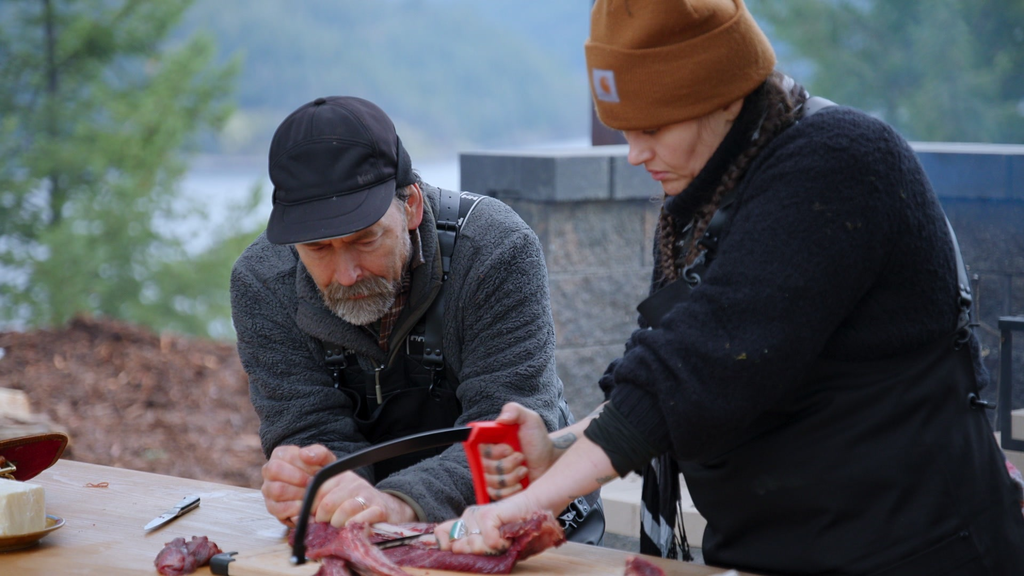
- Details
- By Darren Thompson
Today, Hulu debuts Chefs vs. Wild, a new cooking show that combines 16 seasoned chefs with 10 highly-trained survivalists in the British Columbia wilderness.
Together, they have up to 96 hours to survive and make a restaurant-worthy three-course meal that’s with foraged ingredients and a protein of their choice during a cook-off for a panel that will ultimately choose one final winner.
Each episode follows two contestants with highly-trained survivalists while they are left in the wilderness to build shelter and forage for ingredients. The cooking competition is in a kitchen with multiple wood stoves, small fire pits, grills and cast iron cookware. The winner will be announced on the October 17th finale.
Chefs vs. Wild is hosted by Kiran Jethwa, a Kenyan-born chef, restauranter, media personality, and creator of the YouTube channel Fearless Food. The show presents two Indigenous survivalists, Jordyn Burnouf (Cree, Black Lake First Nation) and Robin Lafreniere (Lake Manitoba First Nation, Anishinaabe); Indigenous chef Nico Albert (Cherokee Nation of Oklahoma); and Indigenous co-host, Valerie Segrest (Muckleshoot Indian Tribe).
“‘Chefs vs Wild’ was an adventure I never imagined I would have the opportunity to experience,” Albert told Native News Online. “I got to push myself in my skills and creativity in one of the most beautiful places I have ever been. It was a challenge and an honor to represent my family and community.”
Albert is a self-taught chef of Cherokee and Acadian heritage who now runs Burning Cedar Indigenous Foods, a catering and consulting LLC in Tulsa, Oklah. During the COVID-19 pandemic, Albert was laid off from his position as executive chef at Duet Restaurant & Jazz Club in the Tulsa Arts District and decided to go “all in on being a part of the Indigenous food revitalization movement. Albert is featured in episode 02 titled, “Oh Matsutake, Where Are You?” available today on Hulu.
Show co-host Segrest says Chefs vs. Wild provides critical visibility for Native chefs and Native food knowledge.
“I've always longed for more Native representation in cooking competitions and survivalist shows so when this opportunity came around I knew it was critical to increasing our visibility in these spaces,” Segrest told Native News Online. “To be able to share perspectives on our foods as teachers and a high-level introduction of the living bodies of knowledge on the land and the water and the possibility of powerful transformation is super exciting.”
More Stories Like This
Two Indigenous Group Exhibits Opening January 9, 2026 at WatermarkWatermark Art Center to Host “Minwaajimowinan — Good Stories” Exhibition
Museums Alaska Awards More Than $200,000 to 12 Cultural Organizations Statewide
Zuni Youth Enrichment Project Takes Top Emerging Artist Apprentices to Phoenix for Artistic Exploration and Cultural Immersion
From Dishwasher to Award-Winning Chef: Laguna Pueblo's Josh Aragon Serves Up Albuquerque's Best Green Chile Stew
Help us defend tribal sovereignty.
At Native News Online, our mission is rooted in telling the stories that strengthen sovereignty and uplift Indigenous voices — not just at year’s end, but every single day.
Because of your generosity last year, we were able to keep our reporters on the ground in tribal communities, at national gatherings and in the halls of Congress — covering the issues that matter most to Indian Country: sovereignty, culture, education, health and economic opportunity.
That support sustained us through a tough year in 2025. Now, as we look to the year ahead, we need your help right now to ensure warrior journalism remains strong — reporting that defends tribal sovereignty, amplifies Native truth, and holds power accountable.
 The stakes couldn't be higher. Your support keeps Native voices heard, Native stories told and Native sovereignty defended.
The stakes couldn't be higher. Your support keeps Native voices heard, Native stories told and Native sovereignty defended.
Stand with Warrior Journalism today.
Levi Rickert (Potawatomi), Editor & Publisher
